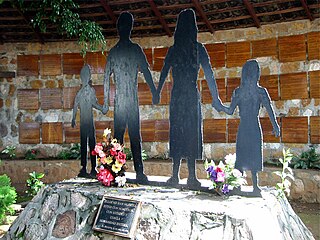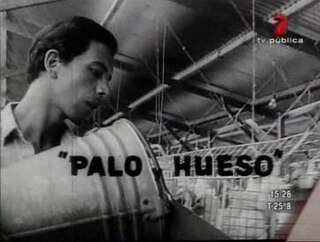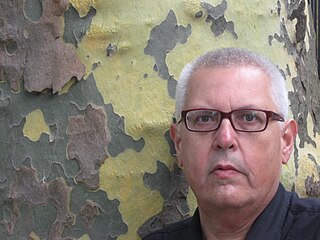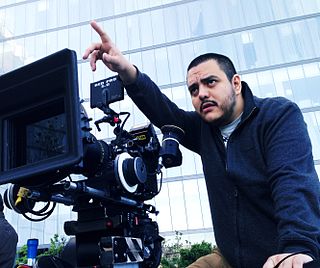
Alma Guillermoprieto is a Mexican journalist. She has written extensively about Latin America for the British and American press, especially The New Yorker and The New York Review of Books. Her writings have also been widely disseminated within the Spanish-speaking world and she has published eight books in both English and Spanish, and been translated into several more languages.

The El Mozote massacre took place both in and around the village of El Mozote, in the Morazán Department, El Salvador, on December 11 and 12, 1981, when the Salvadoran Army killed more than 811 civilians during the Salvadoran Civil War. The army had arrived in the village on the 10th, following clashes with guerrillas in the area. The Salvadoran Army's Atlácatl Battalion, under the orders of Domingo Monterrosa was responsible for the massacre.
Carlos Salces is a self-made producer-writer-director-editor.

Isabel Coixet Castillo is a Spanish film director. She is one of the most prolific film directors of contemporary Spain, having directed twelve feature-length films since the beginning of her film career in 1988, in addition to documentary films, shorts, and commercials. Her films depart from the traditional national cinema of Spain, and help to “untangle films from their national context ... clearing the path for thinking about national film from different perspectives.” The recurring themes of “emotions, feelings, and existential conflict” coupled with her distinct visual style secure the “multifaceted ” filmmaker's status as a “Catalan auteur.”

Bruno Bichir Nájera is a Mexican actor and one of the members of the Bichir family.

Miguel Coyula Aquino is a Cuban filmmaker and writer. Working with a multi-disciplinary approach, his films usually take several years to complete. He has been described by critics as a virtuoso and an innovator. The multi-layered narratives of his films often deal with alienation, they contain graphic depictions of sexuality, and frontal criticism of society and politicians. The controversial nature of his work have resulted in the banning of his work in Cuba, although they have also suffered censorship in Argentina, Belarus, Morocco, and Beirut. The press usually refers to him as the enfant terrible of Cuban Cinema.

Palo y hueso is a 1968 Argentine film released on 7 August 1968, directed by Nicolás Sarquís and starring Héctor da Rosa and Miguel Ligero. The film was shot entirely in Buenos Aires, premiering there on August 7, 1968.

Rufina Amaya was the sole survivor of the El Mozote massacre on December 11 and December 12, 1981, in the Salvadoran department of Morazán during the Salvadoran Civil War.
The Cine Las Americas International Film Festival is an annual film festival based in Austin, Texas, featuring Latin American and indigenous films from the Americas. In its 14th year in 2011, the Festival has grown into a citywide event, with over 100 screenings in a nine-day span. Patrons of the festival are offered a wide variety of films to choose from including narrative and documentary features, short films, animation and youth films.

Víctor Rodríguez Núñez is a Cuban poet, journalist, literary critic and translator.
El Faro is an internationally acclaimed Central American digital news outlet founded in 1998 in El Salvador. In April 2023, El Faro moved its administrative and legal operations to San José, Costa Rica, registering the newsroom as the non-profit Fundación Periódica. The bulk of the newsroom is based in San Salvador, with reporters in Guatemala City and Washington, D.C.

Sergio Tovar Velarde, is a Mexican film director. He directed the feature film Mi último día which was premiered at the San Sebastián International Film Festival and was released commercially in theaters in summer of 2009.
Carlos Henríquez Consalvi, alias Santiago is a Venezuelan author, journalist, radio producer and museum director.

Cayo Hueso is a consejo popular (ward) in the municipality of Centro Habana, Havana, Cuba. A traditionally working-class neighborhood populated by Afro-Cubans, it is known for its many cultural landmarks such as the Callejón de Hamel, the Fragua Martiana Museum and the Parque de los Mártires Universitarios.

Tatiana Huezo Sánchez is a film director of Salvadoran and Mexican nationality, residing in Mexico. Her first film, El lugar más pequeño (2011), a documentary about the Salvadoran Civil War, has been awarded internationally. In 2016 she premiered Tempestad, the story of two women who suffer the consequences of human trafficking in Mexico. It received the 2016 Fénix Award for Best Documentary.
Zamora is a toponymic surname referring to the city of Zamora, Spain.
Isabel Dada Rinker was a Salvadoran actress and poet, considered a pioneer of theater in El Salvador.
Andre R. Guttfreund is a Salvadoran film director, producer and filmmaker. He is better known for the production of the 1976 short film In the Region of Ice, for which he received an Oscar at the 1977 Academy Awards with Peter Werner for Best Live Action Short Film, becoming the first and so far only Central American to receive an Oscar.

Vivir Quintana is a Mexican singer and composer. Quintana penned the song "Canción sin miedo", or Song without Fear, which has become a feminist hymn against gendered violence and femicide.

Forgotten Roads is a 2020 Chilean romantic drama film written and directed by Nicol Ruiz Benavides in her directorial debut. Starring Rosa Ramírez Ríos and Romana Satt.














